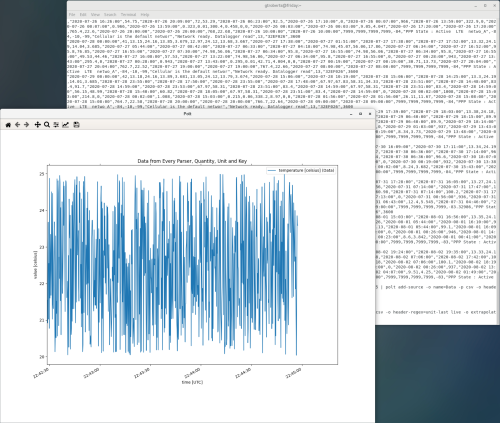






Überblick
Aktuelle Version 4.7
LoggerNet Linux ist die Lösung für Anwender, die LoggerNet in einer Linux-Umgebung betreiben möchten. Zusätzlich ist eine Version von LoggerNet Remote notwendig. Die Windows-basierten Client-Anwendungen in LoggerNet Remote laufen auf einem seperaten Computer und werden zur Verwaltung des LoggerNet Linux Servers verwendet.
Die Software Lizenz-Vereinbahrung für LoggerNet Linux finden Sie im LoggerNet für Linux Handbuch.
Lesen Sie mehrFunktionen und Vorteile
- Capable of running a LoggerNet server in a Linux environment
- Includes all LoggerNet functions
- Provides user- and group-level security for data loggers and data access
- Can be managed from a remote Windows PC using LoggerNet Remote
- Runs as a daemon (Linux equivalent to a Windows service)
- Exports data to third-party applications using command-line tools (CoraScript) or LoggerNet Remote
- Can be accessed by multiple LoggerNet Remote client connections and users at the same time
- Capable of setting up subnets of the network map
- Includes many of the functions of LoggerNet Admin but without a user interface; UI provided by LoggerNet Remote
Bilder

Technische Beschreibung
LoggerNet Linux provides a solution for those who want to run the LoggerNet server in a Linux environment. The package includes a Linux version of the LoggerNet server. A Windows version of LoggerNet Remote is required. The Microsoft Windows-based client applications in LoggerNet Remote are run on a separate computer, and are used to manage the LoggerNet Linux server.
Note: LoggerNet Linux requires LoggerNet Remote, which is available on the Ordering Info page.
Kompatibel mit
Please note: The following shows notable compatibility information. It is not a comprehensive list of all compatible products.
Kommunikation
| Product | Compatible | Note |
|---|---|---|
| KonectPBRouter |
Software
| Product | Compatible | Note |
|---|---|---|
| KonectGDS |
Additional Compatibility Information
Computer
The disk with the LNLinux Server contains a Debian distribution and a Red Hat RPM distribution. Each distribution includes a 64-bit version.
LoggerNet Remote is required for use with LNLinux. The LoggerNet Remote clients used to manage the LNLinux server run on an Intel-based computer with a Microsoft Windows operating system. The recommended minimum computer configuration for running the LoggerNet Remote clients is Windows 7. The LoggerNet Remote clients also run on Windows 8, 10, and 11.
Communications
The LoggerNet server provides communications with the data loggers over various mediums including serial ports, TCP/IP connections, and Linux compatible phone modems.
Spezifikationen
| Current Version | 4.7 |
| Operating System | Windows 11 or 10 (for LoggerNet Remote) |
| RPM Distribution | Red Hat (64 bit) |
| Debian Distribution | 64 bit |
Dokumente
Broschüren Produkte
Handbücher
FAQs für
Number of FAQs related to LNLINUX: 4
Alle anzeigenWenige anzeigen
-
LoggerNet for Linux should run on most distributions with base distributions of Red Hat or Debian.
-
Yes. LoggerNet for Linux (LNLinux) allows the LoggerNet server to be run on a Linux computer. The LoggerNet server collects and stores the data, while setup and management of the network are easily handled from a Windows computer running LoggerNet Remote or, rather tediously, using Cora Command on the Linux computer.
-
The blog article "How to Navigate the World of Software Upgrades, Patches, and Trials" explains the difference between patches (free of charge) and upgrades (for a fee). This example quickly shows the difference between an upgrade and a patch:
Upgrade Patch Major version change, such as 1.3 to 2.0
Minor version change, such as 1.3 to 1.4
Typically requires purchase for a fee
Free of charge
-
When a LoggerNet client, such as the Connect screen (in LoggerNet Remote) needs to connect to a remote LoggerNet Admin or LoggerNet Linux installation, the default port used is 6789.
The default port can be altered using the command line argument ipport. The following is the explanation from LoggerNet Help:
Command line arguments allow you to change LoggerNet's default behavior when it is started from a shortcut. /IPPORT=XXXXX Causes the server to use port XXXXX for TCP/IP communications with clients. This is useful if some other software is using LoggerNet's default port of 6789. Usage: "C:\Program Files\CampbellSci\LoggerNet\ToolBar.exe" /ipport=12345
Anwendungsbeispiele
Horseshoe Irrigation is a small rural irrigation company in central Utah, managing approximately 15,000 water shares......lesen Sie mehr
Lightning strikes are a serious concern for school officials who are responsible for protecting the......lesen Sie mehr
The Oklahoma Mesonet is a statewide environmental monitoring network developed through the cooperative efforts of......lesen Sie mehr




